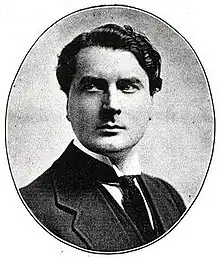John Patrick Campbell
John Patrick Campbell (1883–1962) was a Belfast-born artist known for his illustrations in publications by members of the Gaelic League published under the name Seaghan MacCathmhaoil.[n 1] He was also involved in theatre and related productions. He emigrated to the United States in the early 1910s, and directed the 1913 "Irish Historic Pageant" in New York. His work as a published illustrator or artist seems to have ended by the 1920s.
John Patrick Campbell | |
|---|---|
 | |
| Born | 1883 |
| Died | 1962 |
| Other names | Seaghan MacCathmhaoil. |
| Occupation | Artist |
Biography
John Campbell was born in Belfast on 7 March 1883 one of ten children of William and Catherine.[1] He trained at the Belfast School of Art.[2] Their family were Catholic and Nationalist, and their father a Parnellite, whilst their mother was of a Presbyterian background.[3]
His skill was recognised early on and in 1904 whilst still at the School of Art sent one of his works to the 1904 St. Louis World's Fair.[4] Together with his brother Joseph Campbell he was involved in the production of the first Festival of the Glens (Glen Feis) in 1904 under Francis Joseph Bigger.[3]
His early published works included illustrations for authors of the Gaelic League, including a series for Mary A. Hutton's translation of The Táin (1924),[2] made c.1907.[5] He also illustrated for a number of Irish nationalist journals including Bulmer Hobson's The Republic, as well as cultural journals.[6] He also illustrated his brother Joseph Campbell's folk poetry, in The Rushlight, under the pseudonym 'Ceann-Maor' (Big Head).[7]
His work was influenced by Art Nouveau, Art Deco, and Celtic art styles,[6] whilst also being similar in style to that produced by traditional wood engraving.[8]
In 1911/2 he emigrated to the United States of America, continuing to illustrate.[2][9][6] In America he also became known for his work with the Irish Theatre of America, as well as for directing the 1913 "Irish Historic Pageant", a large scale production held at the 69th Regiment Armory in New York.[9]
After around 1927 his career in the arts and illustration seems to have ended, with no recorded works. He died 19 August 1962.[10]
See also
- Joseph Campbell (poet), his brother
Notes
- In some works, such as Mary Ann Hutton's The Táin, rendered as Seagan macCathamoil.
References
- Larmour 1998, p. 62.
- Newman, Kate, "John Patrick Campbell (1883 - 1962)", www.newulsterbiography.co.uk
- Magee 2005, p. 78.
- Kreilkamp 2016, p. 64.
- Kreilkamp 2016, p. 65.
- "Seaghán Mac Cathmhaoil", An Sionnach Fionn, 25 August 2011
- Hutton, Clare; Walsh, Patrick (eds.), "The Irish Book in English, 1891-2000", The Oxford History of the Irish Book, vol. V
- McCarthy 2017, p. 111.
- Burns, Catherine M. (26 April 2016), "For an Irish National Theater in New York", www.gothamcenter.org
- Larmour 1998, p. 68.
Sources
- Larmour, Paul (1998), "John Campbell (1883-1962): An Artist of the Irish Revival", Irish Arts Review Yearbook, 14: 66–67, JSTOR 20492990
- Kreilkamp, Vera, ed. (2016), The arts and crafts movement : making it Irish, ISBN 978-1-892850-25-6
- McCarthy, Mark, ed. (2017) [2005], Ireland's Heritages: Critical Perspectives on Memory and Identity
- Magee, Jack (2005), "9. Brothers in arts : Joseph and John Campbell and the first Glen Feis", in Phoenix, Eamon; O'Cléireacháin, Pádraic; McAuley, Eileen; McSparran, Nuala (eds.), Feis Na NGleann: A Century of Gaelic Culture in the Antrim Glens, Ulster Historical Foundation, pp. 78–86
As illustrator
- incomplete, for a fuller list see (Larmour 1998, p. 73)
- "Upton's Wolves", The United Irishman, 26 December 1903
- Hughes, Herbert, ed. (1904), Songs of Uladh , with lyrics by Joseph Campbell, his brother
- Fox, Charlotte Milligan (1906), Four Irish Songs
- MacGriogoir, Aodmain (1906), Freamacha na hEireann
- Calendar of the Saints : Patric, 1906
- Carberry, Ethna (1906), Songs from the four winds of Eirinn, James Duffy
- Mary of Carrick, vol. I, 5 March 2019
- Thinkin' Long, vol. II, 5 March 2019
- The Green Woods of Truagh, vol. III, 5 March 2019
- Niamh, vol. IV, 5 March 2019
- The Heathery Hill, vol. V, 5 March 2019
- A Beannacht Leat, vol. VI, 5 March 2019
- Holme, C. Geoffrey; Halton, Ernest G., eds. (1914), Modern Book Illustrators and their work, "The Studio" Ltd, pp. 53–55
- Hutton, Mary Ann, ed. (1924), The Tain, Dublin : Talbot Press